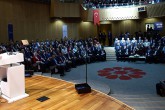As Turkey braces itself for one of the most critical and tensely contested general elections in recent political history, competition between the ruling Justice and Development Party (AK Party) and the bloc formed by three opposition parties keep intensifying by the day. The forthcoming June 7 elections represent a true milestone for the incumbent AK Party as its founding leader, Recep Tayyip Erdoğan, who was elected president last year with 52 percent of the popular vote, is not officially leading a campaign for the first time in more than a decade. In that sense, the opposition parties perceive the campaigns as a perfect opportunity to rattle the dominance of the AK Party in the Turkish political scene, although none of them have realistic hopes for a single-party victory. From another angle, the elections constitute a public vote of confidence for Prime Minister Ahmet Davutoğlu who replaced Erdoğan as prime minister last summer in the party congress. Being aware that a clear victory would galvanize his leadership and the second chapter of AK Party’s “leap forward” agenda, Davutoğlu is conducting a tireless campaign with large party meetings across Turkey.
The real political competition is taking place between the governing AK Party, which is striving to protect its electoral base, and the Peoples’ Democratic Party (HDP) aiming to overcome the 10 percent election threshold to enter Parliament with a bizarre mix of Kurdish nationalists, socialists and ethnic minorities. Interestingly, a significant portion of Kemalists and secular Turkish nationalists are also contemplating to vote strategically for the HDP in order to weaken the AK Party’s grip on political power and undermine Erdoğan’s effectiveness as president. Therefore, for an outside observer, there are myriad complicated alliances, backdoor tactics and strategic positioning between supposedly opposite ideological groups and political movements comprising Turkish and Kurdish nationalists, Kemalists, socialists, Islamists, Alevis and minorities brought together under the common purpose of opposition to the AK Party and Erdoğan.
It is common wisdom that if the AK Party could successfully go through the leadership transition and push for another clear victory under the leadership of Davutoğlu, this will pave the way for another period of long-term single-party rule. Moreover, if the AK Party can get enough seats – over 330 – to instigate a constitutional referendum for the transition to a presidential system, the transformation of Turkish politics will be institutionalized and the opposition’s future hopes will be crushed. But in any case, a comfortable win for the AK Party with say, over 310 seats, will give Davutoğlu ample time to form his new team, revitalize the party structure, focus on structural transformation programs and take the decade-long development narrative of Turkey to a new level. Expectedly, such a scenario would make it nearly impossible for the opposition to topple the AK Party government even in 2019 and therefore, they rightly feel that “now is the time.”All calculations are done to cause the AK Party a sizeable drop in support through pledges of economic populism, identity politics or accusations of mismanagement, waste of public finances and corruption. Mathematically, the game is to push the HDP collectively above the 10 percent threshold and keep the AK Party below 42 percent to 43 percent in order to prepare the conditions for a weaker single-party government that would need to compromise, or even better, a multiparty coalition. But in Turkey’s political history, coalition governments have been marred by internal wrangling, turf wars, failures in governance, acute corruption and so forth. At a time when political polarization has reached its zenith and all opposition parties have come together to undermine the electoral might of the incumbent AK Party, the formation and efficient operation of a coalition government looks extremely unrealistic. If the grand project is to form a major coalition including the Rep
In this article
- Domestic Policy
- Opinion
- 2019
- Elections
- Identity Politics
- Islam
- Kemalism
- Kurdish Nationalism
- Opposition
- Presidential Government System
- Prime Minister
- Recep Tayyip Erdoğan
- The President of the Republic of Türkiye
- Turkish President
- Türkiye's Justice and Development Party | AK Party (AK Parti)
- Türkiye's Peoples' Democratic Party (HDP)

